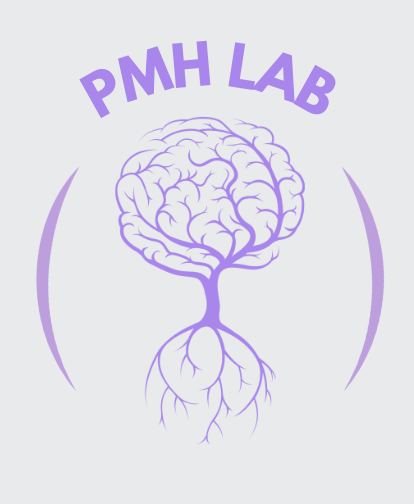About Rachel
Rachel A Plouffe, PhD, leads the PMH lab at the University of Dundee. Rachel is a Teaching and Research Lecturer (Assistant Professor) of Psychology and has extensive research background in personality, individual differences, psychometrics, mental health, and close relationship behaviours. Rachel’s work is grounded in trait-based approaches to psychological functioning, with a particular focus on how personality contributes to risk and resilience in mental health and interpersonal outcomes.
Rachel completed her MSc and PhD degrees in Personality and Measurement Psychology at Western University, London, Canada, where her doctoral research examined the role of individual differences in vulnerability to interpersonal harm, including personality traits associated with victimisation and perpetration of intimate partner violence. During this time, she also developed a strong interest in developing and validating psychological assessment tools. Rachel’s first publication reflects the development of the Assessment of Sadistic Personality (Plouffe et al., 2017), which remains one of the most common measurement tools used to assess levels of subclinical sadism.
Following her PhD, Rachel was a Postdoctoral Associate with the MacDonald Franklin Operational Stress Injury Research and Innovation Centre (MFOSIRC) through St. Joseph’s Health Care and Western University, Canada. During her postdoctoral position, Rachel conducted research studies investigating associations between personality traits, mental health outcomes, and interpersonal functioning. This work involved collaborative projects spanning personality psychology, psychiatry, and psychometrics. For example, Rachel has developed and validated tools to assess moral injury and positive mental health in military Veterans and healthcare workers, two groups often exposed to chronic stress and trauma. Beyond her psychometrics work, Rachel's research explores protective and risk factors for mental health outcomes in these populations, including how individual differences and institutional environments shape psychological well-being. Rachel continues to collaborate with MFOSIRC on further refining mental health assessment tools for use in military members and Veterans.
Rachel’s current research focuses on whether experiences of physical and psychological intimate partner violence (IPV) significantly predict levels of moral injury in the general community. She is particularly interested in how various protective and risk factors may moderate the impact of IPV victimisation on the development of moral injury, a construct traditionally studied in military populations but increasingly recognised in civilian contexts. This work bridges individual differences research with applied mental health, aiming to refine our understanding of how risk and protective factors interact to influence trauma outcomes.
Rachel has advanced training in psychological statistics, with particular expertise in structural equation modelling (SEM). She frequently applies these techniques in her research to test complex models, such as invariance testing, factor analysis, and item response theory.
Rachel currently teaches psychology modules at all undergraduate and postgraduate levels at the University of Dundee. She has achieved Fellowship Certification for Academic Practice in Higher Education, accredited by Advance Higher Education and the Higher Education Academy, United Kingdom.
See below for a full list of current modules:
PY11001 – Introductory Psychology (3 lectures; Evolutionary Psychology)
PY12003 – Psychology & Me – Understanding Ourselves in the Wider World (co-coordinator; joint teaching)
PY21001 – Understanding the Mind (module coordinator)
PY22002 – Individual Development (module coordinator)
PY32004/PY52008 – Psychological Research Skills (test construction practical session)
PY40029/PY50429 – Foundations of Adult Mental Health (module coordinator)
When she’s not at work, Rachel is usually horse riding, dog walking, in the gym, gardening, at choir practice, traveling, trying new foods, or if none of the above, napping :).
Abbreviated Curriculum Vitae
-
2023 – Present
Lecturer (Assistant Professor), Teaching & Research
Division of Psychology
University of Dundee, Dundee, United Kingdom2023 – Present
Affiliate Scientist
MacDonald Franklin Operational Stress Injury Research and Innovation Centre
St. Joseph’s Health Care London, ON, Canada2021 – Present
Adjunct Research Professor
Department of Psychiatry, Schulich School of Medicine & Dentistry
University of Western Ontario, London, ON, Canada -
Intimate partner violence and moral injury: Identifying protective and risk factors (2024-2025). Carnegie Trust for the Universities of Scotland. (£8,866.62; principal investigator).
Measurement matters: Designing and adapting survey measures using open science principles. SGSAH/SGSSS Spring into Methods Competition. (£2,500; lead workshop organiser).
-
Soares, V., Deda, E., Houle, S., St. Cyr., K., Forchuk, C. A., Plouffe, R. A., Liu, J. J. W., Cramm, H., Nazarov, A., & Richardson, J. D. (in press). Perceived barriers and facilitators to mental health access and treatment from military-related operational stress injuries: a qualitative study. Journal of Military, Veteran and Family Health.
Walker, D. L., Dave, H. P., Kowalski, C. M., Plouffe, R. A., Saklofske, D. H., & Fiori, M. (in press). Emotion regulation as a moderator of the ability emotional intelligence-stress reactivity relationship. Journal of Individual Differences.
Trahair, C., Forchuk, C. A., Plouffe, R. A., Hansen, K. T., Richardson, J. D., & Nazarov, A. (in press). Barriers to mental health support among Canadian Armed Forces Veterans: Complicating factors of confidentiality beliefs and moral injury. Journal of Military, Veteran, and Family Health.
Plouffe, R. A., Houle, S. A., Nazarov, A., & Richardson, J. D. (2025). Validation of the Moral Injury Outcome Scale in Canadian health care workers. Psychological Assessment. https://dx.doi.org/10.1037/pas0001386
Denovan, A., Plouffe, R. A., Dagnall, N., Artamonova, E., Kowalski, C. M., & Saklofske, D. H. (2024). Dark Triad, Dyad, or Core? A psychometric evaluation of the Short Dark Triad (SD3) across three countries. Current Psychology, 43, 36086–36103. https://doi.org/10.1007/s12144-024-07030-0
Blötner, C., Dinić, B. M., Denovan, A., Dagnall, N., Krstić, P., Papageorgiou, K. A., Trahair, C., & Plouffe, R. A. (2024). The Machiavellian Approach and Avoidance Questionnaire: Further validation and evidence of cross-national validity. Journal of Personality Assessment. https://doi.org/10.1080/00223891.2024.2431123
Nazarov, A., Roth, M. L., Liu, A., Wanklyn, S. G., Dempster, K. S., Plouffe, R. A., Bird, B. M., Fikretoglu, D., Garber, B., Richardson, J. D. (2024). Discontinuation of mental health treatment among Canadian military personnel Journal of Military, Veteran, and Family Health, 10(5), 72-88. https://doi.org/10.3138/jmvfh-2024-0001
Nazarov, A., Forchuk, C. A., Younger, W. A., Plouffe, R. A., Trahair, C., Roth, M. L., Tuka, A., Shirazi, Z. A., Davis, B. D., & Richardson, J. D. (2024). Beliefs about confidentiality and attitudes toward disclosure of moral injuries among military personnel. Psychological Injury and Law. https://doi.org/10.1007/s12207-024-09521-8
Kowalski, C. M., Plouffe, R. A., Daljeet, K., Trahair, C., Johnson, L. K., Saklofske, D. H., & Schermer, J. A. (2024). A multi-study investigation assessing the potential redundancy among the Dark Tetrad using a narrowband trait approach. Scientific Reports, 14, 17433. https://doi.org/10.1038/s41598-024-67952-4
Liu, J. J. W., Ein, N., Gervasio, J., Baker, C., Plouffe, R. A., Wanklyn, S., Burhan, A. M., Lau, B., Abreu, E., Wasiuta, T., Nazarov, A., & Richardson, J. D. (2024). Ketamine in the effective management of chronic pain, depression, and posttraumatic stress disorder for Veterans: A meta-analysis and systematic review. Frontiers in Psychiatry: Psychopharmacology, 15. https://doi.org/10.3389/fpsyt.2024.1338581
Liu, N., Plouffe, R. A., Liu, J. J. W., Nouri, M. S., Saha, P., Gargala, D., Davis, B. D., Nazarov, A., & Richardson, J. D. (2024). Determinants of burnout in Canadian health care workers during the COVID-19 pandemic. European Journal of Psychotraumatology, 15(1).https://doi.org/10.1080/20008066.2024.2351782
Forchuk, C. A., Kocha, I., Granek, J., Dempster, K., Younger, L., Gargala, D., Plouffe, R. A., Bailey, S., Guest, K., Richardson, J. D., Nazarov, A. (2024). Optimizing military mental health and stress resilience training through the lens of trainee preferences: A conjoint analysis approach. Military Psychology, 37(3), 175-186. https://doi.org/10.1080/08995605.2024.2324647
Nazarov, A., Forchuk, C. A., Houle, S., Hansen, K. T., Plouffe, R. A., Liu, J. J. W., Dempster, K., Le, T., Kocha, I., Hosseiny, F., Heesters, A., & Richardson, J. D. (2024). Exposure to moral stressors and associated outcomes in healthcare workers: Prevalence, correlates, and impact on job attrition. European Journal of Psychotraumatology, 15(1). https://doi.org/10.1080/20008066.2024.2306102
Houle, S., Ein, N., Gervasio, J., Plouffe, R. A., Litz, B. T., Carleton, R. N., Hansen, K., Liu, J. J. W., Ashbaugh, A. R., Callaghan, W., Thompson, M., Easterbrook, B., Smith-MacDonald, L., Rodrigues, S., Belanger, S., Bright, K., Lanius, R., Baker, C., Younger, W., Brémault-Phillips, S., Hosseiny, F., & Richardson, J. D., Nazarov, A. and the Atlas Institute Moral Injury Research Community of Practice. (2024). Measuring moral distress and moral injury: A systematic review and content analysis of existing scales. Clinical Psychology Review, 108, 102377. https://doi.org/10.1016/j.cpr.2023.102377

